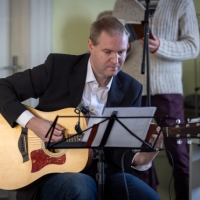DjangoBooks.com
Welcome to our Community!
Categories
- 20K All Categories
- 1.1K General
- 485 Welcome
- 59 Archtop Eddy's Corner
- 146 CD, DVD, and Concert Reviews
- 385 FAQ
- 26 Gypsy Jazz Italia
- 27 Photos
- 209 Gypsy Picking
- 21 Unaccompanied Django
- 15 Pearl Django Play-Along Vol.1
- 17 Gypsy Fire
- 45 Gypsy Rhythm
- 1.4K Gypsy Jazz University - Get Educated
- 131 Gypsy Jazz 101
- 230 Repertoire
- 227 History
- 709 Technique
- 51 Licks and Patterns
- 6 Daniel Givone Manouche Guitare Method Users Group
- 20 Eddie Lang Club
- 1.3K Gypsy Jazz Gear
- 814 Guitars, Strings, Picks, Amps, Pickups and Other Accessories
- 465 Classifieds
- 52 Recording
- 63 Other Instruments
- 18 Violin
- 5 Mandolin
- 22 Accordion
- 7 Bass
- 11 Woodwinds
- 351 Gypsy Jazz Events
- 144 North America
- 112 Europe
- 95 International











Comments
Similarly, I play my very young Dupont everyday and to me it sounds better every time, of course that's biased, but my brother who only hears me play it once in a while says it sounds louder and sweeter each time he hears me again.
This story was told to me by a friend who's studying to become a luthier: they brought an old Italian violin to his school, it belonged to a lady who played first violin in a European orchestra, he said the violin was incredible but only sounded that way if it was perfectly tuned to concert pitch, which in some European countries is A 441 or 442 (i don't remember which one), they tuned it to our concert pitch, A 440, and it just lost all it's sweetness. He said that because it had been played so many years at that frequency, it had "opened up" and developed amazing sonic qualities but they didn't remain if the tuning was altered even slightly.
It may be exaggeration fueled by romantic beliefs, but then again...
Yeah, it *is* interesting... now let me "stir the pot" some more: On my drive home thise evening I thought (apart from "How the f^%& did that (_!_) get a Driver's License!?!?) about another possibility for what may cause a guitar to "open up": The glue for the top braces hardens over time. Some, notably hide glue, crystallize with age. If an instrument is played as the glue "matures," maybe -just maybe- the vibrations have an influence on the size and shape of the crystals and *this* subtly effects the tone.
Ok, as long as I'm tossing around ideas... I remember for the longest time "experts" were saying the reason Cremona violins from the 1600s had such a special sound was the finish. Much effort went in to trying to duplicate that varnish. Well, that wasn't it...
Maybe the wood was more mineralized, either naturally or artificially...? Nope, that wasn't it.
The latest theory (and it seems plausible) is that the wood harvested for those fiddles came from trees that were grown during a period of extended drought in western Europe. The result was less growth over a couple of centuries and, therefore, the wood had tighter grain from the smaller growth rings.
Now, if you could find a contemporaneous tree (still living) or a hidden stash of wood that Stradivarius or Guarneri tucked away... and you made a Selmac top out of that wood....
-k
"Now we're going to throw this vintage Selmer off a ten story building, to see if it indeed bounces..."
In regards to the Strads and Cremoras, one theory is that the woods used came from trees that had grown through the "Little Ice Age," and had smaller growth rings as a result. This would probably enhance the acoustic properties. As for the finish being a special secret formula, I'm reminded of the excellent film The Red Violin, where the sixteenth (seventeenth?) century violin maker used the blood of his deceased wife in the varnish, giving the violin its rich timbre and influencing the musicians who played it throughout the centuries. (I had thought about refinishing all my guitars with such a varnish during my lengthy divorce period.)
OOPs... just kidding folks.
One other note of trivia on the film The Red Violin: it may be the only Samuel L. Jackson flick in which he didn't utter the word Motherf-.... or did he? I forget.
www.billbarnestrio.com
"Listen to this, it speaks like a cathedral!"- Django, on the Selmer (from Michael Dregni's Django, the Life and Music of a Gypsy Legend)
Leigh